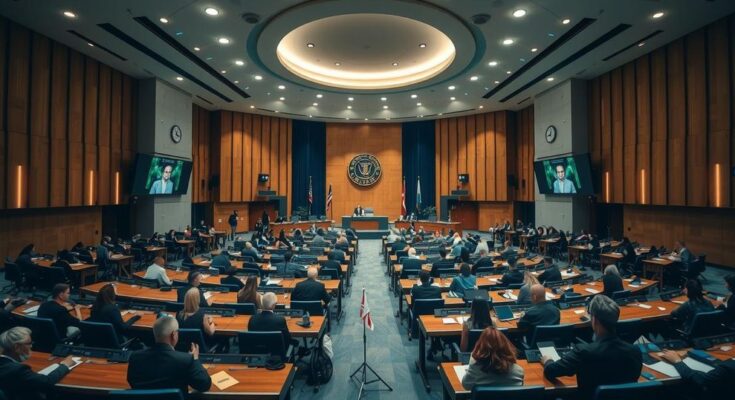Negotiators at the UN climate talks in Baku are grappling with familiar challenges reminiscent of past failures in climate conferences, including COP6 in 2000 and COP15 in Copenhagen in 2009. Historical disputes and logistical issues continue to undermine efforts to establish consensus on climate policies and financial commitments, with recent talks on biodiversity also ending in disappointment. The necessity for renewed discussions in 2025 highlights the ongoing need for effective international collaboration on climate issues.
Baku (AFP) – As UN climate negotiations continue in Baku, negotiators face significant challenges in reaching a consensus. This situation is not unprecedented in the history of these conferences. Since the inaugural UN climate conference in 1995, numerous sessions have been marred by disputes and failures to agree on critical terms. Notably, COP6 in The Hague in 2000 stands out as the only occasion when talks were abruptly suspended due to disagreements, primarily influenced by the uncertain outcome of the U.S. presidential election at that time.
The uncertain political climate surrounding the election created a situation where delegates were reluctant to forge agreements. Alden Meyer, a seasoned observer of climate diplomacy residing at the E3G think tank, recalled the tension during COP6: “There was that uncertainty. They couldn’t agree. And ministers started leaving and they had to suspend the COP.” The primary contention revolved around the use of land use credits in emission reduction commitments under the ambitious Kyoto Protocol.
Ironically, the subsequent election of President George W. Bush, who retracted the U.S. from the Kyoto Protocol, galvanized the remaining countries towards making progress, particularly in Bonn, where the EU took a leading role to ensure ongoing climate action.
Reflecting on past missteps, COP15 in Copenhagen in 2009 remains a cautionary tale where great expectations clashed with disillusionment. Following President Barack Obama’s election, anticipation elevated significantly when global leaders converged in Denmark. However, the talks faltered due to a lack of decisions made by leaders, creating resentment among smaller nations regarding their exclusion from negotiations. Despite efforts to forge an agreement, the climate accord produced at Copenhagen fell short of establishing binding targets while merely recognizing ongoing climate challenges.
Significant logistical issues also plagued the Copenhagen event, with participant exhaustion exacerbating the situation. “In Copenhagen, there was no longer anything to eat or drink on Saturday,” remarked Paul Watkinson, a former French negotiator, highlighting the disarray that characterized the conclusion of talks. More recently, biodiversity negotiations in Cali, Colombia concluded without fiscal commitments, reflecting an ongoing trend of unfinished business in climate conferences. Colombia plans to resume these discussions in early 2025, showcasing the persistent challenges faced by international environmental negotiations.
The challenges faced at UN climate conferences underscore a long-standing trend of disputes and failures to reach consensus. Since their inception in 1995, these conferences have often been characterized by disagreements over protocols and commitments, notably surrounding environmental policies such as the Kyoto Protocol. Historical instances such as COP6 and COP15 illustrate the effects of political dynamics and participant engagement on the negotiations, as emotional and logistical challenges often contribute to a lack of resolutions and consensus.
The ongoing struggles at UN climate conferences, marked by historical failures and contentious negotiations, illustrate the complexities of achieving global consensus on climate action. The repeated inability to finalize commitments and agreements reveals significant friction among participating nations, driven by varying interests and diplomatic dynamics. Future negotiations will require not only effective collaboration but also innovative strategies to overcome longstanding barriers and facilitate a unified approach to tackling climate change.
Original Source: www.rfi.fr




